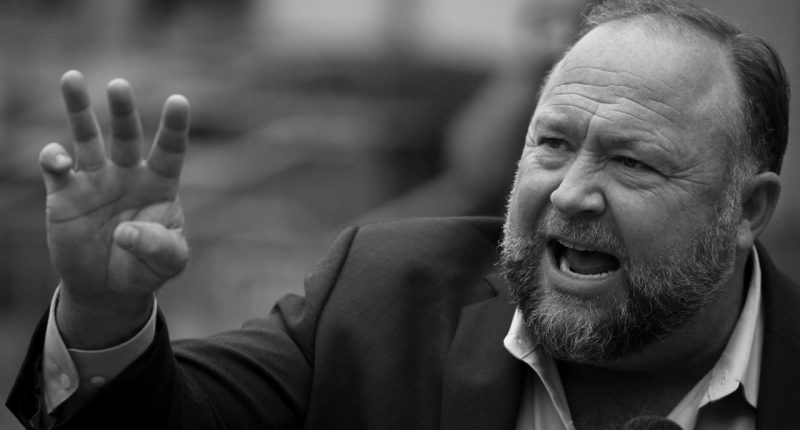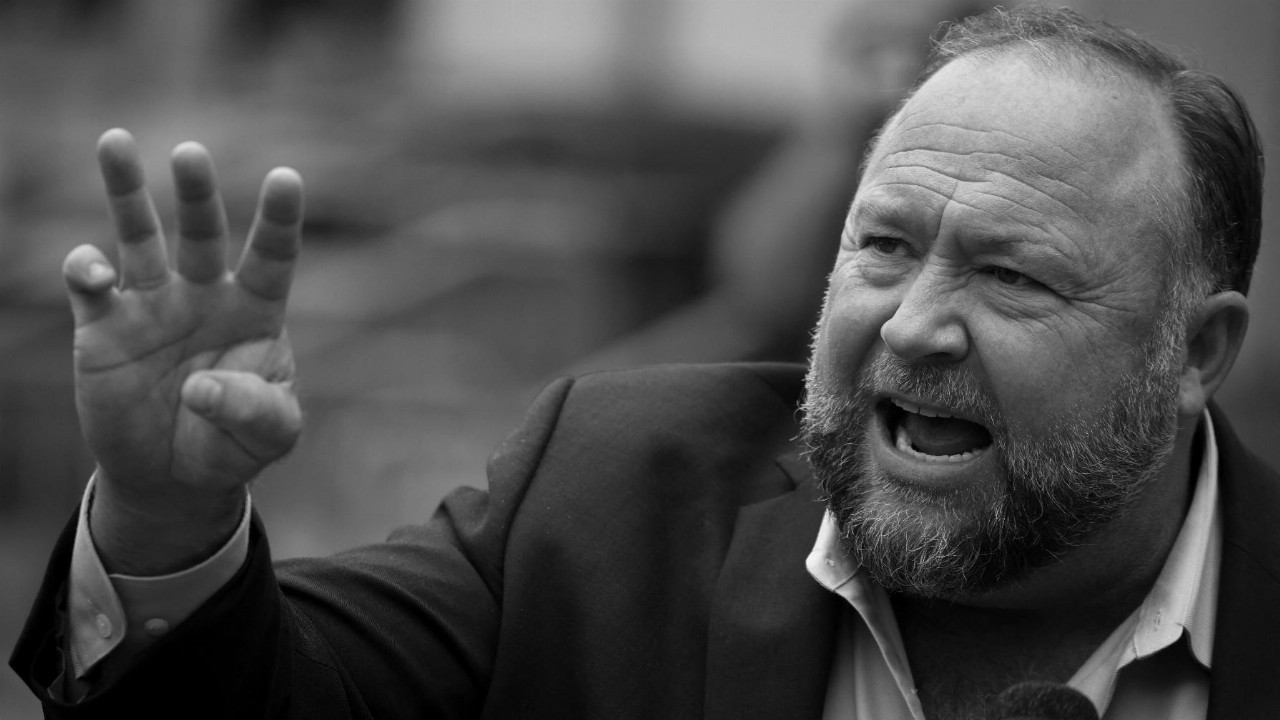Alex Jones achieved the epitome of despicability and now has been ordered to pay for it. His lies — that parents of children killed at Sandy Hook Elementary School in 2012 had been actors taking part in a government plot to manufacture a pretext for stricter gun control — were blatant. He did not subtly deceive through misleading framing or cherry-picked facts. He targeted parents of murdered children, who faced a barrage of threats; at least one family had to flee, moving away from where their child was buried.
Now a Connecticut jury has ordered Jones to pay $965 million in damages to several families for his egregious cruelty, adding to a Texas jury award of $49 million in August to another Sandy Hook family.
Defamation lawsuits can provide some relief to victims of horrendous lies, but they cannot fully repair the damage that has already been done.
For example, many Fox News hosts took to claiming voting machine fraud was a reason that President Joe Biden had won the 2020 presidential election. They also often invited guests like Rudy Giuliani and Sidney Powell who asserted the same. After Smartmatic, a company that provided voting systems to Los Angeles County during the election, sent a 20-page legal letter asking for a retraction of “false and defamatory statements,” some Fox News shows ran fact-checking segments, debunking their own lies. Since then, Smartmatic and other voting machine companies have begun defamation lawsuits against Fox News and others. Meanwhile, the lies are still accepted as fact by many supporters of Donald Trump.
Defamation and libel lawsuits can be misused: Companies or individuals with deep pockets can sue scientists who object to claims about their products or newspapers that expose their wrongdoing, for example. The costs of defending against such claims can have a deterrent and silencing effect. But that’s an argument for better protections against frivolous suits, not against holding liars accountable.
Defamation lawsuits are not an easy path to accountability. Plaintiffs must prove not just that statements were false but also that they caused harm. In the case of public figures, plaintiffs must prove that the defendant either knew the statements were false or that they showed a reckless disregard for the truth.
But the key issue is, the current media ecology makes it lucrative to lie outrageously.
The extent of Alex Jones’ wealth is opaque, but a forensic economist who testified during Jones’ Texas trial estimated that his net worth, combined with that of Free Speech Systems (the parent company of his Infowars media network), is between $135 million and $270 million. Jones put Free Speech Systems into Chapter 11 bankruptcy in August; the Sandy Hook families have challenged the legitimacy of that bankruptcy in court.
Jones got his start in talk radio peddling 9/11 conspiracies to great success. In later years, beyond his own webpage hosting his show, he found a home on platforms like YouTube and Facebook, where he could not only broaden his reach but also benefit from being recommended and amplified by the algorithms that prioritise “engagement” — which has often meant pushing inflammatory, tribalising or conspiratorial content. Many Trump supporters were — and are — great fans. One comprehensive study from the Harvard Berkman Klein Center (where I’m a faculty associate) found that before the 2016 election, he was the 13th most shared source on Twitter among then-candidate Trump’s supporters. From 2015 to 2018, his show averaged about $53 million in revenue annually.
In 2018, after outrage over the way social media sites amplified such content, Facebook, YouTube and Spotify, among other major sites, removed his show. But by then, his machinery was in place, and, on the basis of witness testimony and Free Speech Systems’ bankruptcy filing, his company continued making millions of dollars each year.
From what, you might wonder? In 2014, most of his then $20 million revenue came from selling supplements such as “Super Male Vitality,” according to testimony Jones gave in a court case. After he was banned from major social media platforms in 2018, he expanded his sales, offering a 50 per cent discount for at least one of his alleged testosterone boosters to “push back in the fight against the globalist agenda” — a bargain at $34.95. Also available at the time was Survival Shield X-2 — Nascent Iodine, which Jones’ website describes as having been developed using “thermodynamic pressure sensitive high energy sound pulse nano-emulsion technology.” A newer version of the product is described as derived from “ancient sea salts” found “thousands of feet below the Earth’s surface” and formulated “with our fellow patriots in mind.” Really, it’s a steal at $19.95, all major credit cards accepted.
During the Texas trial, a producer of his show testified that its online store generated over $165 million in revenue during a few months in 2015 and from 2016 through 2018, by selling survivalist gear, supplements, what-have-you. The trial also revealed that the families had pleaded with him for many years to stop airing lies about their murdered children, because they faced not just direct threats and confrontations but also people who said they’d defile their children’s graves. According to the families, Jones ignored them as those lies increased product and supplement sales.
One might think it’s just this one con man who found a lot of marks (a lawyer for Jones once called him a “performance artist” who is merely “playing a character”), but others have used the same approach.
Fox News required its workers in New York City to be vaccinated against COVID-19 in the winter of 2021, and at least in the summer of 2021, even vaccinated workers were still required to put masks on in closed spaces with multiple people. You hardly would have realised that from watching all the anti-vaccine and anti-masking content that was routine on Fox News.
Many viewers appear to have paid a huge price for that cynical disparagement of lifesaving vaccines.
A recent study in Scientific Reports found that areas with higher levels of Fox News viewership had lower COVID vaccination rates, which are associated with higher hospitalisation and death rates. This impact of Fox News was independent of local health care capacity or even partisanship. Plus, much of this effect was concentrated on people younger than 65, who might have thought they were safer from COVID, the study authors noted, and perhaps more open to messages of vaccine hesitancy and refusal.
Even foot soldiers of the movement who sincerely bought into the anti-vaccine nonsense, suffered. According to a report from The Boston Globe, at least five conservative radio talk show hosts who campaigned against the vaccines died from COVID over just a few months in 2021.
It has become so easy to lucratively lie to so many people, and we have few realistic and effective defenses against the harms of deceptions like these, not just to individuals but to our society.
Good speech isn’t going to push out lies when viewership is so fragmented, nor is the solution fact checks of various levels of quality by institutions already not trusted by many.
There have been campaigns to get major social media platforms to act more aggressively to get rid of liars, but why should we trust them to decide who should be banned? What if political winds shift?
What’s the solution? No society can be constantly pulled at its seams like this and escape unscathed. The recent Jones verdict certainly did some damage to the industry of lucrative lying, and perhaps few are as deserving of this result as he is. But laws written for a different era cannot resolve the problems of our current media ecology.
There are no easy, quick solutions, but perhaps a starting point would be to make it harder and less lucrative to lie to huge audiences. Rather than pursuing legally dubious and inadvisable efforts to ban speech or define and target misinformation, regulations should target the incentives for and the speed with which lies can be spread, amplified and monetised.
One part of the solution might be to target reckless data surveillance online, by greatly limiting how much data can be collected, how long it can be retained, what it can be used for, and how it can be traded. Among other benefits, this could make chasing engagement less attractive as a business model.
There could also be new, careful versions of the Fairness Doctrine — which required mass broadcasters that essentially held a monopoly on the public sphere to present broader viewpoints on topics of public importance. It wasn’t a perfect solution, and it could be weaponised, but it recognised that good speech can confront bad speech only if there is access to the same audiences. Versions for the 21st century might involve a requirement that when blatant or harmful lies on issues of public importance are amplified, the people who are sent those lies are also sent corrections and further explanations.
But we should also work hard at making the rest of society work much better so that liars can’t do as much damage. I keep coming back to how people over 65 have higher rates of vaccination, despite higher Fox News viewership and some in that age group having a greater propensity to believe misinformation. That’s possibly because they are more motivated to brush off lies in light of the higher risk they face from COVID, but perhaps also because Medicare allows them to have medical providers they trust. Similarly, for example, regulating the supplement industry — a common vehicle for conspiracy and political grift — and having stricter standards on advertising claims might help, too.
The work of civilisation is not just discovering and unleashing new and powerful technologies, it is also regulating and shaping them, and crafting norms and values through education and awareness, that make societies healthier and function better. We are late to grapple with all of this, but late is better than never.
This article originally appeared in The New York Times.
Zeynep Tufekci, a New York Times Opinion columnist, writes about sociology and the social effects of technology. She is a visiting professor at the new Craig Newmark Center for Journalism Ethics and Security at Columbia Journalism School and an associate professor at the University of North Carolina’s School of Information and Library Science.






